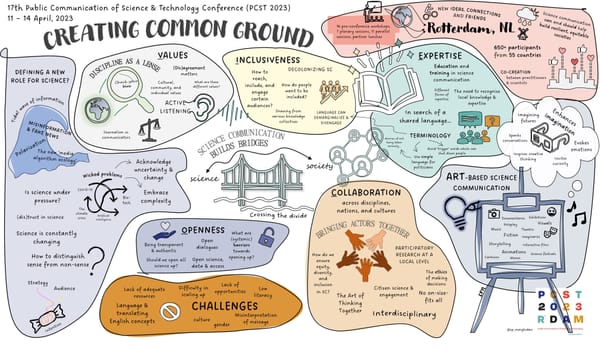ScienceOnline starts in Leiden
Every year in the United States, the popular ScienceOnline conference is held for anyone who communicates about science and uses new and social media to do so. I went there for the first time in February 2013 and was so enthusiastic that I took the initiative for a ScienceOnline Leiden community.

"What is the purpose of your visit to the United States?" The grumpy homeland security officer snarls at me at the airport. "I'm going to the ScienceOnline conference in Raleigh, North Carolina," I say enthusiastically. "If it's science online, why do you have to come here?", he answers with a grimace as if he thinks he's punctured my weak excuse. Without knowing it, he has grasped the essence of ScienceOnline: bringing people who only meet online together in real life to exchange experiences.
Wide audience
I go to congresses more often where communicating about science is the main theme. But ScienceOnline differs from a "standard" conference on two important points.
The audience is unprecedentedly diverse. Where other conferences often appeal to a specific target group, ScienceOnline attracts people who are interested in the central theme: communicating about science with modern digital means. I met scientists, students, teachers, doctors, journalists, librarians, bloggers, educators, programmers, museum staff and others who are interested in how the internet is changing the way science is communicated, taught and done.
Unconference
ScienceOnline calls their meeting an unconference. The name badges do not contain more than your name and Twitter handle. By doing so, the organisation wants to reduce the barriers for people to talk to each other. For example, a high school teacher happens to get into a conversation with a journalist from the New York Times, and it is easier for a student to address a professor. Does it work? Yeah, it does. Because no one displays their "descent", there is a relaxed atmosphere where conversations are more about content than about how "important" someone is.
This atmosphere of informal exchange of experiences is also reflected in the sessions. There are no long presentations from a speaker with a PowerPoint talking to a room. A typical ScienceOnline session consists of two moderators who make sure that the participants talk to each other about a certain theme. Because of the diverse background of the participants, the discussion is richer than at conventional conferences. The theme can be anything from 'how to write a book' to 'how to get more people interested in science' to 'how to keep a blog going for years'.
Sometimes the focus of a session is more on science, sometimes more on online. What they have in common is that Twitter plays a big role: there is a separate # for each session, where you can ask your questions, make comments, respond to each other, share links, and so on. That most people look at the screen of their iApparatus more than at each other during such a session is therefore completely accepted.
Leiden community
The concept holds sway in the USA. The 450 seats for the annual conference are sold out within ten minutes. In a number of American and Canadian cities 'satellites' have already been created. Communities of people who meet regularly to talk about a theme for an evening.
In Leiden there is probably a lot of enthusiasm for that too, I thought. Leiden is not called the 'city of discoveries' for nothing. Science is in its blood and canals. The city is home to the oldest university in the Netherlands, a thriving Bio Science Park, countless museums and about ten percent of the members of the Association for Science Journalism and Communication Netherlands. Leiden is also home to blogging, tweeting, Facebooking and even emailing people who like to talk about science. Because it is their profession, because they teach it to others, because they communicate about it.
Everyone we talk to about it so far is enthusiastic. So we started ScienceOnline Leiden. We are hoping for a large turnout at our first conference in Leiden, which we will hold on 30 May 2013 from 5 to 8 pm at De Nieuwe Energie.
Participate
Who can participate? Any scientist, journalist, student, blogger, communicator, or member of the public interested in science. Whether you are interested in alpha, beta or gamma sciences, whether you are an experienced twitterer or still doubt whether social media is something for you, be welcome! Even if you do not live in Leiden and a trip to Leiden is no problem for you, you are very welcome. We have room for 75 people, so register quickly when the registration form opens on our website at the beginning of May.
Do you have any questions or would you like to stay informed? You can find us at the digital coordinates below. Until the 30th of May!
This is a guest blog written for Wetenschapper 2.0.




